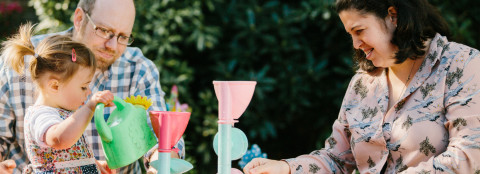
Having autism as a parent might seem impossibly challenging. But a generation of parents with the condition is showing that it can be an advantage — even when their child does not share the diagnosis.
It’s going on 8 p.m., and Kirsten Hurley’s house in West Cork, Ireland, is a scene of happy chaos. The children — Alex, 9, and Isla, 4 — have been promised chocolate if they stay out of their mother’s hair while she talks with a journalist via Skype.
But the bribe doesn’t seem to be working — at least not with Isla, who climbs up her mother’s back and somersaults over her shoulder, cackling with delight.
“This is something that drives me nuts,” Hurley says. The nonstop and often intense sensory inputs that come along with being a parent — being grabbed at, being climbed on, listening to the drone of “Mom, Mom, Mom, Mom, Mom” — can be difficult for her to handle because she has a mild form of autism sometimes known as Asperger syndrome.
Hurley was diagnosed with Asperger syndrome at age 23, when her son was about 14 months old. Alex received his own autism diagnosis about a year later. (In the United States, Asperger syndrome was subsumed into the larger category of autism spectrum disorder in 2013, but in Ireland and elsewhere it remains a distinct diagnosis.)
In some ways, their shared condition has made it easy for Hurley to parent her son. “Alex always kind of seemed really logical to me,” she says. Isla, by contrast, does not seem to be on the spectrum, and her ordinary preschooler behavior sometimes baffles her mother. She has an insatiable need for attention, from Hurley’s perspective, and she might do something like reject a cup of orange juice moments after specifically requesting orange juice. “The things she does that I think are really abnormal because Alex didn’t do them are actually, like, typical children things,” Hurley says, laughing.
Hurley handles many such puzzles of being a parent on the autism spectrum with self-awareness and a healthy dose of humor. But at times, when she has reached out for help she has been misunderstood. Hurley once mentioned to a new therapist she was seeing that she has Asperger syndrome. The therapist asked if she loved her children — “which wasn’t very helpful,” Hurley says. “People have these kinds of misconceptions about people with autism, that they don’t feel emotion.”
Hurley is not so far out of the ordinary as one might assume: A surprising number of people diagnosed with autism are raising children. An online survey recruited more than 300 mothers with autism, suggesting that there are probably thousands of parents diagnosed with autism worldwide, and perhaps hundreds of thousands or millions without a diagnosis. More evidence comes from Facebook groups, messaging platforms and blog comments, where parents compare notes and share problem-solving strategies.
Autism can pose challenges for parenting, their stories indicate. In addition to dealing with sensory overload, helping a child learn social skills can be difficult for people who struggle with social interactions themselves, for example. But autism can also provide valuable parenting skills, especially with a child who is also on the spectrum.
Still, as far as the scientific literature is concerned, these parents might as well not exist. It’s only in the past few years, since scientists have become interested in studying adults with autism, that they have begun to ask questions about this group of parents. “I think what we’re seeing now in the 21st century is a recognition that people with autism are perfectly capable of participating in all aspects of life, but they may have been doing that almost invisibly — and that includes parenthood,” says Simon Baron-Cohen, director of the Autism Research Center at the University of Cambridge in the United Kingdom.
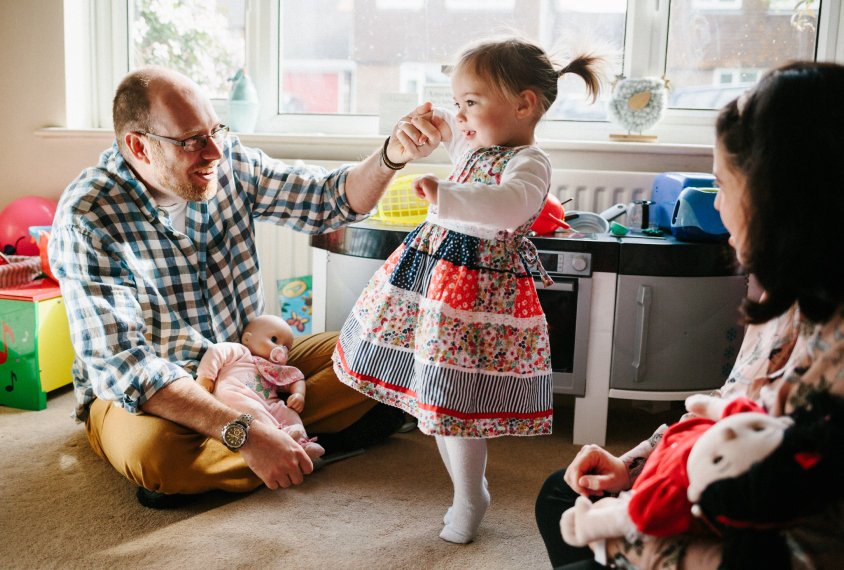
Dance with me: Gillan and Lizzie Drew with their daughter Izzie, at their home near Christchurch, England.
The lack of research so far not only offers these parents little support, but also leaves society unprepared for the larger wave of people diagnosed with autism who are just coming of age and may be considering having children. Without enough information or support available to them, these young people may conclude that becoming a parent is just not an option for them.
“It breaks my heart to even say those words, but that’s the message that I’ve heard: ‘Does having autism or Asperger’s, does that mean that being a parent is just not a thing for me?’” says Matthew Lerner, assistant professor of psychology, psychiatry and pediatrics at Stony Brook University in New York. The experiences of Hurley and many other parents who are pioneering what it means to be a parent with autism could temper that worry with hope.
Possible parents:
The idea that a person on the spectrum could be a parent was long considered nearly impossible. When Edward Ritvo submitted a paper on the subject to the Journal of Autism and Developmental Disorders in 1988, he titled it “Eleven possibly autistic parents.” Without that caveat, he says, he is pretty sure it would never have been published.
“That paper was rejected eight times by eight of the major psychiatric and medical journals,” says Ritvo, now professor emeritus of psychiatry at the University of California, Los Angeles. “Nobody believed it. They didn’t believe the parents had it, that autistic people could grow up and marry and have children.”
At the time, autism was perceived as a severe disorder, usually accompanied by intellectual disability, and the overwhelming emphasis of research was on children with autism. Yet the parents who appeared in that brief paper had characteristics that are now easily recognizable as features of autism: repetitive behaviors such as arm flapping and rocking back and forth, unusual rituals such as arriving exactly 30 minutes late for every engagement, social disinterest, a lack of eye contact.
Further publications from Ritvo’s team made it clear that it wasn’t an anomaly for people on the spectrum to have children: A 1994 paper described 14 people with autism who had 54 children among them. Most of them were parents of children that Ritvo’s team had seen in the clinic. Ritvo and his colleagues had become interested in these parents because they wanted to show that autism is a physiological condition with an inherited basis — and not, as was widely believed through the 1960s and 1970s, the result of psychological trauma.
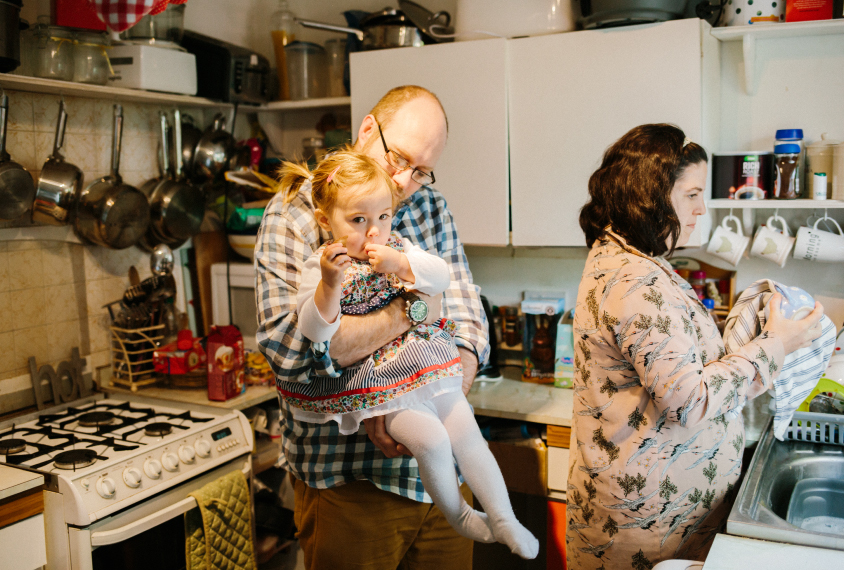
Family feeling: Both parents are on the spectrum; their daughter Izzie does not seem to be.
These observations helped launch the study of autism genetics. Meanwhile, the lives of these parents went unexamined. Even now, no one knows what proportion of adults with autism have children, what proportion of their children might end up on the autism spectrum, or how common it is for children with autism to have a parent who also has the condition. And those basic questions don’t even begin to explore what life is like for parents with autism: their struggles with parenting, the strengths they bring to the task of raising children, how their hopes and fears evolve as their children grow up.
Virtually the only empirical study of the experiences of parents with autism is an online survey of 325 mothers diagnosed with autism worldwide, conducted by Baron-Cohen’s team. The unpublished data capture responses to 89 questions devised with input from women with autism. They include topics such as pregnancy and childbirth, the social experience of motherhood and the strengths and weaknesses of parents with autism.
The mothers with autism in the survey were more likely to report prenatal and postnatal depression compared with a group of 91 typical women raising at least one child with autism. They were more likely to feel isolated, and judged by others; many said they didn’t have anyone to turn to for support, and often felt unable to cope with parenting.
For some parents, the prejudice and stigma surrounding autism can have dire consequences. Damon Matthew Wise Âû and his wife saw firsthand that parents with autism are vulnerable to extra scrutiny from child welfare agencies. Wise Âû is a pioneer of the self-advocacy movement by people with Asperger syndrome and lives in Shannon, Ireland. His wife, Karen, is also on the spectrum, as are their three children, who also suffer from chronic ailments such as food intolerances, insomnia and skin conditions.
Since their youngest child was born in 2003, Wise Âû and his wife had occasionally used respite care, or temporary childcare, through the foster-care system for a few hours or a weekend. By mid-2009, with the encouragement of social workers, the younger two children were spending a few days out of the home each week. But in early 2010, the couple learned that child welfare authorities had started efforts to put all three children into full-time, permanent foster care. According to Wise Âû, the authorities never gave any legal justification for this plan. He says the episode reflects prejudice on the part of child welfare agencies that people on the spectrum aren’t suitable parents. Finally, in May 2010, the agency dropped its plan.
Wise Âû’s oldest son wasn’t diagnosed with Asperger syndrome until he was almost 16, though his parents had suspected he was on the spectrum since before he was 2 years old. Doctors and social workers “thought we caused him to exhibit autistic traits, by learning it from us,” Wise Âû recalls. The doctors suggested that the couple wanted their son to be on the spectrum — as if they had Munchausen syndrome by proxy, a psychiatric disorder in which people feign illness in their children in order to draw attention to themselves.
The couple also felt excluded by support groups for parents raising children with autism. In those groups, they sometimes encountered the sentiment that the condition is a tragedy, or a disorder to be cured. “We have been kicked and shunned for being parents who are autistic with autistic children,” Wise Âû says. (They set up a Facebook support group of their own, where talk of cures is discouraged.)
“It’s sometimes really hurtful and disappointing to me that I can’t help them when they’re in an emotional state.” Kimberly, a mother on the spectrum
Logistics and emotion:
Parents with autism may face practical challenges borne of their condition. For example, many people with the condition struggle with executive function, the set of complex mental processes that allow people to plan and carry out daily activities. They also have a tendency to become deeply immersed in what they are doing — to the detriment of other priorities. Hurley says in her case, this has made it difficult to meet the logistical demands of raising her children, such as getting them to school on time, and keeping them clean and fed. When her children were younger, she would write out step-by-step lists to help her accomplish daily tasks: Get the bottle ready. Make the food. Give the bottle and the food to the child. Put the plates in the dishwasher. Wipe the table. Check the floor for crumbs. See if the child is clean.
Some parents on the spectrum find tasks such as parent-teacher meetings to be draining because social interactions require great cognitive and emotional effort on their part. Others have problems with auditory processing that make verbal communication difficult. The blunt manner common among people with autism may also lead some parents to cause offense where none is intended. In Baron-Cohen’s survey, more than 60 percent of mothers with the condition said they struggle to communicate with teachers, doctors and other professionals regarding their children and feel anxious about such meetings.
The emotional work of parenting can also be a challenge for people with autism. However, far from being oblivious or indifferent, as the stereotype of autism might suggest, these parents are often acutely aware of their children’s emotions, but struggle to provide support. “It’s sometimes really hurtful and disappointing to me that I can’t help them when they’re in an emotional state,” says Kimberly, a woman living in Northern California who has a 10-year-old daughter and a 13-year-old son. “I tend to get very overwhelmed by all the raw emotion that comes from my 13-year-old and am less equipped to deal with it and recover from it.” (Kimberly requested that we not use her last name.)
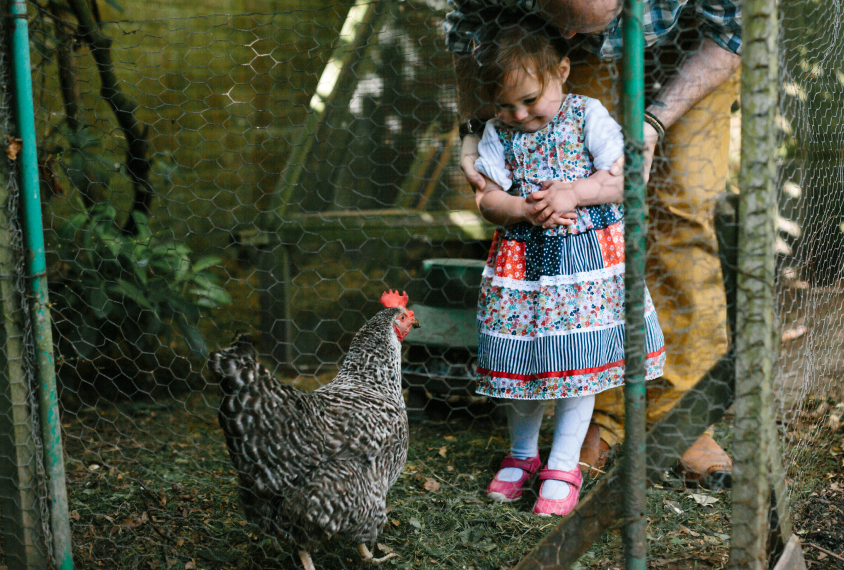
Taking flight: Gillian Drew is determined to help his daughter explore the world, despite his sensitivities.
Hurley foresees herself facing similar difficulties as her children grow older. “When Alex was younger and he was really sad about something, I’d just tell a fart joke,” she says. But she knows that tactic isn’t likely to work forever. “If you’re 14 and you’re having real trouble with bodies and relationship sorts of things, your mom making fart jokes isn’t going to fix it,” she says. She and her husband have planned for him to take the lead on such issues — but she also wishes she had more guidance on how to handle them.
The expectation that a woman will be the primary, hands-on parent can place extra burdens on mothers with autism. New mothers who don’t enjoy socializing in kaffeeklatsch-style groups can be left without a support system. Women may feel pressure to organize play dates and social outings that leave them spent — and the constant demands of parenting can also make it difficult for them to find the solitude they may require to recharge. “It’s much easier for fathers to check out, I think — go hide in their workshop or shed or whatever their man-cave happens to be,” says Rochelle Johnson, a woman with autism who lives near Melbourne, Australia, and has three daughters, two of whom have autism.
But fathers with autism also face pressures, says Johnson, who came out as transgender last year. “Autistic men seem to be very rigid about the way things should be done or shouldn’t be done, and I think that can come across in a very authoritarian kind of parenting style,” she says. In her view, these fathers seem strict not because they want to bend their child to their will, but because they are seeking the safety of routine and ritual.
With greater societal awareness of these challenges, some could have simple solutions. For example, some parents with autism may find it easier to make doctor appointments online rather than by phone, or conduct teacher conferences by email rather than in person. Others might need help with establishing household routines when their children are infants. Yet when Baron-Cohen and his team analyzed the survey data, they found that 80 percent of the U.K. mothers with autism said they had not received the help they requested from schools, doctors and social welfare agencies.
All in the family:
In spite of the difficulties they may face, many parents with autism say having children has helped them deal with their condition; some even say their autism has made them a better parent than they would otherwise have been.
Having children can be a bulwark against the isolation that afflicts so many adults with autism. “I’ve noticed that a lot of people that I meet are really, really lonely — adults who’ve been diagnosed and they’re not in relationships and they don’t have families,” says Hurley. “I’d hate it if I was on my own all the time.” Children offer her an entrée into a social milieu that’s more welcoming than she finds adults to be. “I love hanging around with kids,” she says. “I love the energy of it, and the fact that the conversations are really easier — whereas with adults you have to be far more careful about what you say and how you say it.”
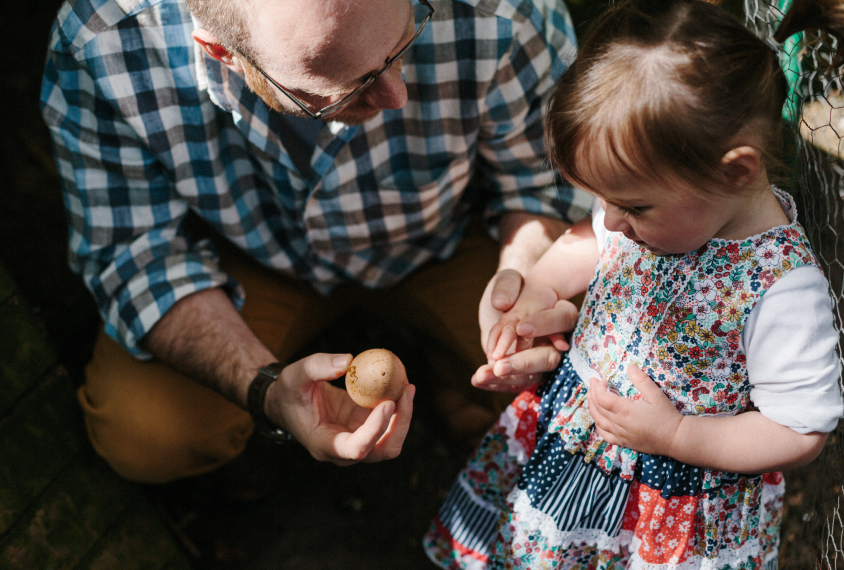
Nest egg: Parents like the Drews may be a source of advice for other parents with autism.
In Kimberly’s case, having children helped her overcome her crippling need for routine and sameness. “It was the ability to accept that I could lay a plan out for the day — and it may be ended by explosive diarrhea, or I’m going to say we’re going to the grocery store at 10, and it’s not going to happen,” she says. “In my pre-child life, I couldn’t have dealt with that.”
On the other hand, some of these same autism features can offer an advantage to parenting. Kimberly says her drive for structure and organization has benefited her children in some ways. “I run everything, so whether it’s tennis or doctor appointments or camps or what classes they’re in or making sure they’re introduced to new ideas and new activities and new experiences, that’s all me,” she says. “I’m on top of all that.” In fact, her methodical and tenacious nature may explain why Kimberly decided to become a single mother and adopt her first child. (She subsequently married, and she and her husband adopted a second child.) “It’s so Aspie,” she says, laughing. “Once I decided to adopt, I was like a pit bull; I got every possible piece of information that I could.”
No scientific studies have explored whether having autism yields benefits for parenting, but the idea rings true to clinicians. “My clinical experience is that some of the parents with autism are fantastic parents,” Baron-Cohen says. “The same kind of obsessive approach that characterizes autism in other ways can be a really positive thing in parenting.”
Perhaps the most striking advantage is in the case of parents with autism who have a son or daughter also on the spectrum. “As an autistic parent, I’m in a unique situation of being able to have an insight into where they’re coming from, what they’re thinking and feeling,” says Johnson. When her oldest daughter was about 8, Johnson recalls, she used to get in trouble at school for putting her head down on the ground when the class sat on the floor. It turned out that the girl was ‘listening’ to the teacher in the next classroom through the vibrations.
Johnson intuitively understood the situation. “On one level, as a parent, you’re like, ‘Well, you need to pay attention in class,’” Johnson says. “On the other level, you have a real empathy for how that makes perfect sense, as crazy as it may sound.” Johnson remembers doing unusual things when she herself was a child, such as feeling compelled to perform an action the same number of times with her right and left hands.
Parents on the spectrum can pass on the lessons they have learned to their child; they can also bond with their children about shared difficulties. Hurley’s son Alex sometimes has what she calls “depression attacks,” short bouts of intense sadness that don’t necessarily have a specific trigger, but instead emerge from a general feeling of being overwhelmed. Alex, a quiet boy with large brown eyes and freckles, struggles to put his experience into words. “How I feel — I can’t explain it really, how I feel,” he says. But he says his mother understands him. Hurley remembers similar feelings from her own childhood and still experiences them sometimes. Her coping method is to slow down and remind herself that the feelings are temporary. She helps Alex do the same, supporting him without pressing him to provide a reason for his sadness.
“The same kind of obsessive approach that characterizes autism in other ways can be a really positive thing in parenting.” Simon Baron-Cohen
The next wave:
Until the 1990s, most people diagnosed with autism had a relatively severe form of the condition, and so were unlikely to have children. But greater awareness of autism, as well as a broadening of the diagnostic criteria, have led to a growing wave of people with milder forms of the condition being diagnosed — and therefore more parents and potential parents with autism.
An increasing number of people are being diagnosed in adulthood, including some who are already parents. “Very often, it’s the child’s diagnosis that prompts the [parent] to question and seek out a late-in-life diagnosis for themselves,” says Susan White, co-director of the Virginia Tech Autism Clinic in Blacksburg, Virginia.
These days, most parents with autism are in that situation — diagnosed after having children, and perhaps because of their children. In the future, most will know they have autism before becoming parents. They may face new challenges: others questioning whether they are capable of parenting, for example, or coping with confusing feelings if their child turns out to share their autism diagnosis — or doesn’t.
“I never wanted to be a father,” says Gillan Drew, who lives in a small village in southern England with his wife, Lizzie, who also has autism, and their nearly 2-year-old daughter. “I didn’t want to pass on either my autism or my depression.” Drew didn’t learn he has autism until he was 28, but he found out before meeting his wife and before deciding to become a parent. (His book for adults newly diagnosed with autism was released in March, and he also blogs at Aspie Daddy.) His wife — at the time, his girlfriend — badly wanted a child, and eventually Drew changed his mind. “It was almost a spiritual thing,” he says. “I was worried that I wouldn’t be able to cope, but what if I could? What if I was letting the possible pitfalls prevent me from experiencing the greatest thing I’d ever done?”
So far, their daughter Izzie doesn’t show signs of autism, which is a relief, he says, “just because I know how difficult it can be.” But it’s also a worry, especially for his wife. “She is terrified that as Izzie gets older she’ll sort of overtake her in social skills,” Drew says. He has found it fascinating to observe his daughter as she learns to share, to communicate her wants and needs, and even to play her parents against each other. It’s a second chance for him to learn social skills, but also a painful experience that throws his own social challenges into sharp relief. At playgroups, “she’s going in there and she’s learning, and while she’s learning, I’m kind of standing back learning while watching her,” he says. “But she’s better than me, because she’s doing it naturally.”
Drew is acutely aware of being a parent with autism, and constantly monitors himself to make sure he provides what his daughter needs. Before Izzie was born, he read multiple accounts written by adults who blame their difficult childhoods on a parent they suspect had autism. The parents described in many of these accounts were never diagnosed, and no scientific study has assessed the effects of having a parent with autism. Still, he was worried. He says his own father probably had autism. He remembers longing for praise, but his father would instead critique the drawings he brought home from preschool: “Move the eyes a bit over, and the nose is the wrong shape.”
The possibility that his child might similarly suffer gave him pangs — and Drew determined to alter his behavior in certain ways. He forces himself to go to child-friendly events with bright colors and loud sounds even though he finds them overwhelming, for example. He suppresses the urge to cringe when his daughter’s hands are covered with applesauce or oatmeal, not wanting her to pick up his abhorrence of mess and mushy textures. And he gushes over every piece of artwork his daughter produces. The irony is that his awareness of having a condition that makes it difficult for him to express affection has transformed virtually his every action into an expression of love.
Drew’s experiences have convinced him that people with autism need advice on topics that standard parenting classes and baby manuals don’t cover. “I’ve spent so much time focusing on [how] I need to kiss her, I need to cuddle her, that I suddenly realized the other day that I’ve never told her I love her,” he says. “And I thought, ‘Well that’s strange, because you’d think that would be a natural thing that you’d say, but it’s never once gone past my lips. So now I need to make a conscious effort to say, ‘Love you.’”
Unfortunately, that sort of help is hard to come by. Because both he and his wife have autism, the government dispatched a social worker to evaluate the family when his wife became pregnant. But once it was clear that the baby would not be in danger of abuse or neglect, she dropped the case. When the couple asked for more support from their own individual social workers, who help with issues such as employment and finances, they were told that parenting advice was out of their purview.
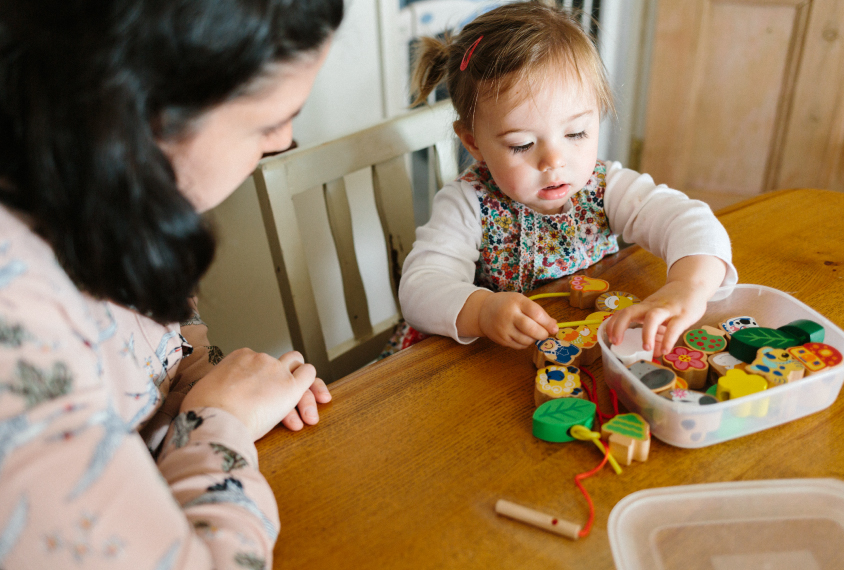
Toy story: Some clinicians say autism has benefits for parenting.
In fact, people like the Drews may actually be best suited to help researchers compile the targeted advice parents seek. “I think we have to start identifying cases of success, and find out what went right,” says White. Every parent has particular talents and weaknesses. But precisely because of their diagnostic label (and, perhaps, the tendency toward rumination that comes along with it), many parents with autism have spent a lot of time pondering things that others may take for granted — whether that’s practical considerations about organizing a day with an infant or toddler, or deeper questions such as how best to demonstrate love and care in the way their child needs. “I think a lot more about parenting than a lot of the other people I know,” Hurley says.
A few researchers are pushing to understand these parents’ needs, as a first step to offering solutions. Baron-Cohen plans to follow 40 mothers with autism and their babies from pregnancy until the children are 2. His team aims to track the babies’ development because they are considered at increased risk for autism, but also to ask about the mothers’ experiences. “We’re working to basically hear the views of women with autism,” Baron-Cohen says. For example, do women with autism feel able to advocate for themselves during prenatal appointments? Do they find support groups for new mothers useful? “We need to listen to them and find out what the experience is like,” he says.
Despite the ups and downs, for Hurley, parenting is a source of meaning and joy. “My house is mad, but I love it,” she says. During this evening’s Skype session, even her frustration is tinged with fondness. She pulls Isla onto her lap and folds her up in her arms. “Do you want a cuddle, will that calm you down?” she asks, hugging Isla tight as she leans over her laptop to resume her conversation. Later, when Isla grows restless again, Hurley calls to Alex, who shepherds his little sister out of the room to let his mother chat in peace.
“I know there are things that my kids will miss out on because I have the diagnosis. But I try and make up for it,” Hurley says. She is, for example, raising her children in an atmosphere of acceptance toward autism, which didn’t exist when she herself was growing up. For Alex especially, “I think in the future it will pay dividends that he’s been brought up in this place where autism is talked about positively and openly,” she says.
Though Isla isn’t yet old enough to leave her mother alone even for the duration of a phone call, Hurley is already thinking about one day being a grandparent. Her husband’s parents often take the children for sleepovers, and she hopes to do the same with her own grandchildren someday. When she shares this daydream, she doesn’t distinguish between her children: Parenthood is a possibility for both Alex and Isla.
from https://spectrumnews.org/features/deep-dive/unexpected-plus-parenting-a…